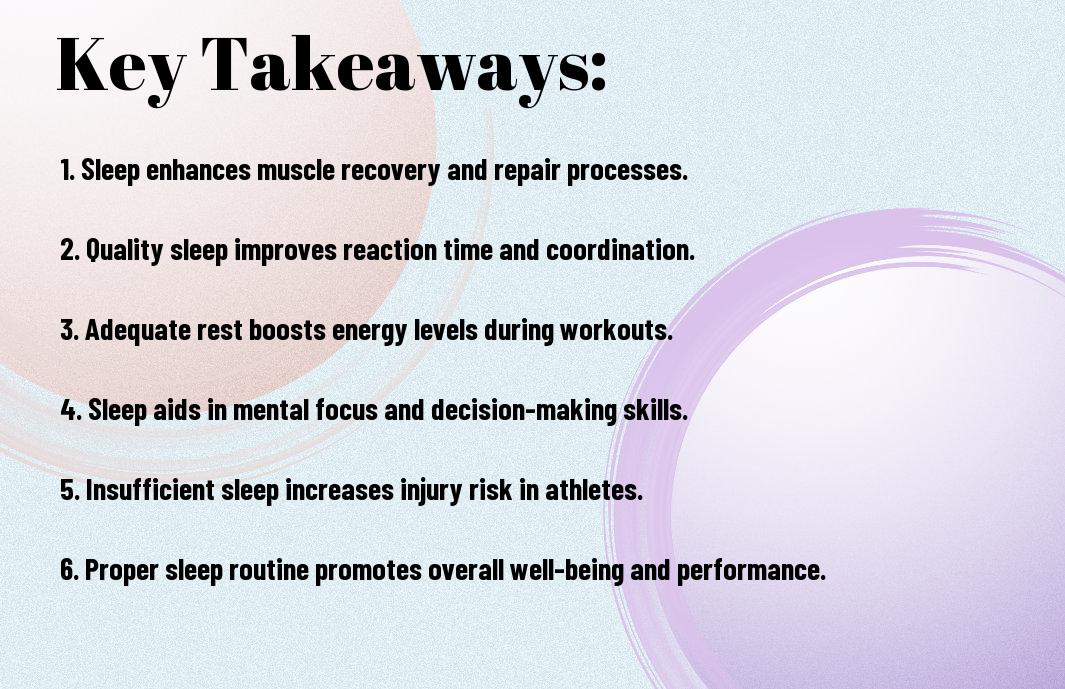It’s vital to recognize that quality sleep significantly impacts your athletic performance. When you prioritize rest, your body has the opportunity to recover, repair muscle tissue, and restore energy levels, all of which are vital for peak performance. Insufficient sleep can impair your concentration, reaction time, and overall stamina, potentially hindering your athletic abilities. Understanding the relationship between sleep and performance can help you make informed decisions that enhance not only your training but also your competitive edge.
Key Takeaways:
- Recovery: Sleep facilitates muscle repair and recovery, allowing athletes to perform at their best.
- Performance: Quality sleep enhances reaction times, speed, and overall athletic performance during practices and competitions.
- Focus: Adequate sleep improves concentration and decision-making skills, which are crucial during high-pressure situations.
- Injury Prevention: Sufficient rest helps reduce the risk of injuries by supporting physical and cognitive functions.
- Hormonal Balance: Sleep regulates hormones that influence metabolism, growth, and stress, all of which are vital for peak athletic performance.
The Science of Sleep
While sleep may seem like a passive activity, it plays a vital role in the physiological and psychological processes that enhance athletic performance. During sleep, your body undergoes complex restoration, including muscle repair, memory consolidation, and hormone regulation. These processes are crucial for recovery, allowing you to perform at your best. Understanding the science behind sleep helps you appreciate its impact on your athletic endeavors.
Sleep Cycles and Stages
To optimize your athletic performance, it’s important to understand the different sleep cycles and stages. Sleep is categorized into Non-Rapid Eye Movement (NREM) and Rapid Eye Movement (REM) stages, cycling through approximately every 90 minutes. NREM stages facilitate deep restorative sleep for your body, while REM sleep supports cognitive functions and emotional resilience. Balancing these stages is key to achieving the restorative benefits needed for your fitness goals.
Effects of Sleep on Physical Performance
An optimized sleep schedule can dramatically enhance your physical performance. Quality sleep improves endurance, strength, and agility, allowing for more intense training sessions and better overall results.
This improvement is due to several factors, including enhanced energy levels, faster reaction times, and improved focus during your workouts. Additionally, adequate sleep helps regulate the hormones that control appetite and metabolism, contributing to better body composition. By prioritizing sleep, you prepare your body to recover efficiently and perform optimally, maximizing your potential as an athlete.

Sleep and Recovery
One of the most significant aspects of recovery is the quality of your sleep. Adequate rest allows your body to repair and regenerate, which is vital for maximizing athletic performance. Research reveals that sleep enhances muscle recovery, cognitive function, and overall well-being. To learn more about How Does Sleep Affect Athletic Performance?, consider the various benefits that improving your sleep routine can provide.
Muscle Repair and Growth
Muscle recovery takes place primarily during deep sleep stages, where your body releases growth hormone and repairs muscle fibers stressed during workouts. By prioritizing quality sleep, you enhance cellular repair processes that contribute to muscle growth, enabling you to train harder and recover faster.
Hormonal Regulation
After a night of inadequate sleep, your body’s hormonal balance can be disrupted. This imbalance can affect not only your recovery but also your performance during workouts and competitions.
Hormonal fluctuations caused by poor sleep can lead to increased cortisol levels, which may impede muscle recovery and growth. Additionally, sleep deprivation can lower testosterone levels, which are vital for muscle mass and strength development. By ensuring you get sufficient sleep, you can maintain optimal hormonal levels that support your athletic endeavors and overall health.
Cognitive Functions and Decision Making
Your mental acuity plays a significant role in your athletic performance, as it encompasses how you make quick decisions and navigate strategy during competitions. Adequate sleep enhances your cognitive functions, allowing you to process information more efficiently, analyze opponents, and react in high-pressure situations. This improved clarity can lead to better judgment calls on the field, resulting in a competitive edge over others.
Mental Stamina and Focus
An athlete’s mental stamina is vital for sustaining concentration throughout competitions and training sessions. Sufficient sleep helps maintain your focus, allowing you to push through physical and mental fatigue. This endurance supports your ability to stay engaged and alert, making it easier to execute complex strategies and elevate your overall performance.
Reaction Time and Coordination
With proper rest, your body’s ability to react to stimuli improves significantly. Sleep deprivation can slow your reaction time, making it harder to respond effectively to your environment. The coordination between your brain and muscles relies heavily on how well-rested you are, as sleep promotes motor skills and muscle memory that are vital for success in athletics.
Consequently, if you find yourself underperforming, it may not be solely due to physical training but rather a lack of restorative sleep. Enhanced coordination and quicker reaction times can set you apart from competitors, allowing you to capitalize on fleeting opportunities during games and races. Optimal rest revitalizes your neuromuscular pathways, facilitating seamless movement and sharper responses, which directly contribute to your overall athletic prowess.
Common Sleep Disorders Among Athletes
Unlike the general population, athletes often face unique sleep challenges that can compromise their performance. Factors such as intense training schedules, travel, and competitive stress can lead to sleep disorders like insomnia and sleep apnea. Recognizing these issues is crucial for maintaining optimal athletic performance and overall well-being. By being aware of these disorders, you can take proactive steps to improve your sleep quality and, in turn, your athletic capabilities.
Insomnia and Sleep Apnea
Beside the physical demands, many athletes experience insomnia and sleep apnea, conditions that disrupt restful sleep. Insomnia may stem from pre-competition anxiety or irregular training schedules, while sleep apnea often occurs due to factors like obesity or specific anatomical features. Both disorders can diminish your recovery and hinder performance, emphasizing the need for awareness and intervention.
Strategies for Better Sleep
Better sleep can be achieved through a combination of lifestyle modifications and effective sleep hygiene practices. Establishing a consistent sleep schedule, creating a relaxing bedtime routine, and optimizing your sleeping environment can significantly enhance your sleep quality. This will not only improve recovery but also elevate your athletic performance.
The importance of establishing effective strategies for better sleep cannot be overstated. Implementing a regular sleep schedule where you go to bed and wake up at the same time every day can train your body to recognize when it’s time to sleep. Creating a dark, quiet, and cool sleeping environment will help reduce disturbances. Furthermore, limiting caffeine intake and avoiding screen time before bed can prepare your mind for rest. Prioritizing relaxation techniques, such as deep breathing or meditation, can also elevate your sleep quality, resulting in enhanced performance on the field or in the gym.

Nutritional Considerations for Enhanced Sleep
To optimize your sleep quality and enhance athletic performance, consider incorporating specific nutritional strategies into your routine. Certain foods can act as natural sleep aids, while the timing of your meals can significantly influence your body’s ability to wind down at night. Prioritizing these nutritional aspects will not only help you sleep better but also enhance your recovery and overall athletic capabilities.
Foods that Promote Sleep
Around bedtime, focus on consuming foods that are rich in tryptophan, magnesium, and melatonin. Some excellent options include almonds, turkey, bananas, and oatmeal. These foods can help regulate your sleep cycle, making it easier for you to fall asleep and stay asleep throughout the night.
Timing of Meals
Above all, the timing of your meals plays a significant role in your sleep quality. Eating a large meal too close to bedtime can disrupt your sleep, making you feel uncomfortable and alert. It’s generally advised to finish your last meal at least 2-3 hours before you go to sleep to allow your body to properly digest the food.
Plus, aligning your meal times with your natural circadian rhythm can enhance your overall sleep quality. Ideally, aim for a balance of macronutrients in your evening meal, incorporating lean proteins, healthy fats, and complex carbohydrates. This strategy will help you avoid spikes in blood sugar, allowing your body to gradually transition into a restful state as you prepare for sleep.
Creating an Optimal Sleep Environment
Many athletes underestimate how much their sleep environment impacts their quality of rest. To maximize your recovery, it’s vital to create a sleep haven. Aim for a dark, quiet room with a comfortable mattress and pillows that support your sleep position. Regulating the temperature to a cooler setting can enhance sleep quality, while reducing ambient light and noise will also promote deeper rest. By optimizing your physical environment, you set the stage for restorative sleep that supports your athletic performance.
Sleep Hygiene Practices
An effective sleep routine includes consistent sleep and wake times, making it easier for your body to establish a natural rhythm. Engage in relaxing pre-sleep activities, such as reading or stretching, to signal to your body that it’s time to wind down. Limit caffeine and heavy meals in the hours leading up to bedtime, and create a soothing atmosphere in your bedroom. These sleep hygiene practices help ensure that you are well-rested and ready to perform at your best.
Using Technology Wisely
Using technology can either disrupt or enhance your sleep quality, depending on how you apply it. Limiting exposure to screens at least one hour before bed can reduce blue light interference, which may impede melatonin production. Consider setting up a sleep-friendly environment by using apps that promote relaxation or track sleep patterns, ensuring you interpret the data intelligently and adapt as needed for better recovery.
Even with the right technology, it’s important to set boundaries. For instance, while sleep-tracking devices can provide insights into your sleeping habits, focus on the overall trends rather than getting caught up in nightly fluctuations. Use technology to enhance your sleep, such as sleep meditation apps or white noise machines, which can promote relaxation. This thoughtful application of tech will support your efforts to cultivate an optimal sleep routine, ultimately boosting your athletic performance.
Summing up
With this in mind, prioritizing sleep is important for enhancing your athletic performance. Quality rest not only aids in recovery but also sharpens your focus, boosts your strength, and improves your overall physical health. By recognizing the significance of restful sleep, you can optimize your training regimen and give your body the time it needs to repair and grow stronger. Make sleep a key part of your strategy, and you’ll likely see enhanced results in your athletic endeavors.
FAQ
Q: Why is sleep crucial for athletes?
A: Sleep plays a vital role in athletic performance by allowing the body to recover and repair itself after rigorous training sessions. During sleep, the body undergoes processes such as muscle growth, tissue repair, and hormone regulation. Quality sleep can improve reaction times, coordination, and overall endurance, which are key components of athletic success. Athletes who prioritize sleep often experience enhanced focus and decision-making abilities during competitions.
Q: How does sleep affect an athlete’s mental health and performance?
A: Sleep has a significant impact on mental health, which in turn affects athletic performance. Adequate rest helps reduce stress and anxiety levels, promoting a more positive mindset. Poor sleep can lead to increased irritability, mood swings, and lack of motivation, hindering an athlete’s ability to train effectively or perform well. A well-rested athlete tends to have better concentration and overall cognitive function, translating into improved performance on the field or court.
Q: What are the recommended sleep durations for athletes?
A: Although individual sleep needs may vary, it is commonly recommended that athletes aim for 7 to 9 hours of sleep per night. Some may require more, especially during heavy training phases when the body demands extra recovery time. Athletes should also consider incorporating short naps into their routine, which can help alleviate fatigue and enhance performance. Ultimately, maintaining a consistent sleep schedule is beneficial for achieving optimal restorative sleep.

